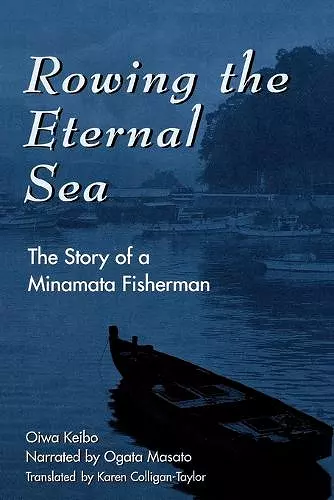Rowing the Eternal Sea
The Story of a Minamata Fisherman
Keibo Oiwa author Ogata Masato editor Karen Colligan-Taylor editor
Format:Paperback
Publisher:Rowman & Littlefield
Published:16th Oct '01
Currently unavailable, and unfortunately no date known when it will be back

In the early 1950s fisherfolk and other villagers around Minamata Bay on the western coast of Kyushu, Japan, began to suffer from mysterious and often fatal symptoms of what came to be known as Minamata disease. It was not until 1968 that the government acknowledged its cause—organic mercury poisoning from effluent released by Chisso Corporation, a chemical manufacturer and the largest employer in the Japanese city for which the disease was named. For decades the company denied responsibility and was joined by the Japanese government in its attempt to cover up the problem despite lawsuits and political protests. In this compelling oral history, Ogata Masato, fisherman and Minamata disease sufferer, tells of the devastation of methyl mercury poisoning. Spanning fifty years, his story describes the impact of industrial pollution on his own life, on his extended family, and on the fishing culture of the Shiranui Sea. A one-time leader of Minamata disease patients seeking certification and compensation, Masato breaks away to follow his personal path to redemption. Masato's story begins with the vibrant village of his childhood and culminates with the possibility of return, if not to one's birthplace, then to a spiritual community, to a consciousness that we owe our existence to the web of interrelationships that constitute life. When we turn full circle, explains Masato, we find ourselves again at the water's edge, a place where all life gathers. This is the launching point for "Tokoyo," boat of the Eternal World-a world defined at once by the past, present and future; a state of mind in which we are responsible not only for our own actions but for those of our society and our species. Masato's story, larger than any one man or one incident, raises questions we must all consider as beneficiaries of modern industry and technology.
It is an important story, focusing on the socioeconomic aspects that get short shrift in the biomedical literature. The book recounts Masato's childhood, coming of age, self-realization, and the crusade he carried out to gain recognition for sufferers of Minamata disease. * CHOICE *
Oiwa Keibo eloquently transcribes Masato's story from early days and a simple life fishing the Shiranui Sea, through the growing shadow of the disease across family community and livelihood, to a struggle for compensation marked by growing self-awareness and powers of leadership and, in an extraordinary act of redemption, the decision to withdraw from the certification process for which he had fought so long and hard, and take control over his own fate, free of dependency. Ogata rows the eternal sea as the pilot of his soul-disease and its discourse transcended. * Times Higher Education *
Ogata has a message that goes further than what happened in Minamata. * Kyoto Journal *
Wonderfully translated and interpreted now for a Western audience, what was a worthy book has become a great book that articulates the pain of a sensitive pilgrim recounting a dramatic and universal tale of progress. -- Gavan McCormack, The Australian National University
This book is a diamond, an eloquently told life history of compelling importance and profound depth. Masato's story is relevant to English readers on many levels, not just as a personal account of an environmental tragedy and travesty with global implications, but also as an exposé of the ways some corporations and governments degrade humankind and the earth, as an exploration of life in a traditional Japanese community, and as a unique opportunity to learn from a man of extraordinary spirit, dignity, intelligence, and wisdom. -- Richard Nelson, author of The Island Within
ISBN: 9780742500211
Dimensions: 229mm x 147mm x 13mm
Weight: 327g
206 pages